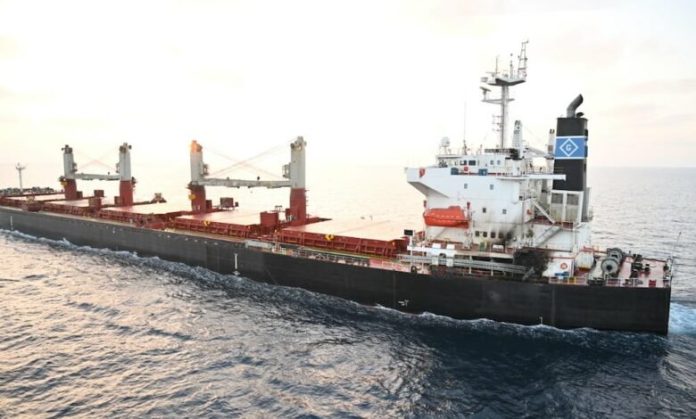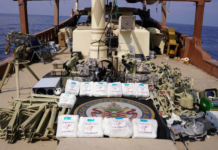
By Alexandru Cristian Hudișteanu*
Global trade is the backbone of modern lifestyles and economies, with some 90 percent of trade being carried by sea. The non-maritime world has become more aware of the global shipping system’s importance during the supply chain troubles of the COVID-19 pandemic, the Suez Canal blockage of March 2021, and the recent grain challenges of the Black Sea. But the awareness of its importance has not necessarily been matched by a similar awareness of its need for protection. The Centre for International Maritime Security.
If one could traditionally look at maritime security as a stable state of affairs where stakeholders can conduct maritime business without fear, then this ideal helps highlight a different dimension to maritime security. It can become a token, a poker chip in the game of international power struggles.
In practice, maritime security is usually viewed from the lens of what disturbs it, based on an insecurity perspective. Most of the time this has to do with piracy and armed robbery at sea, illegal, unregulated and unreported (IUU) fishing, illicit trafficking, and terrorism. All of these threats typically come from lightly equipped non-state actors. But the Houthis’ actions of recent months, targeted against shipping in the Red Sea, highlights a disruptive method of how to leverage maritime security in service of power struggles. Now we can consider maritime security from the perspective of who selectively grants it, under threat of force, and for self-serving ends.
The Houthis commenced a maritime insecurity campaign in the Bab el-Mandeb area. Their claimed reasoning for attacking the ships is rather simple. Actors that help Israel become legitimate targets in the Houthis’ eyes, with “help” being very broadly defined. But what is at play here is the transformation of maritime security into a bargaining chip, a token in a larger-stakes game the Houthis are playing at the expense of the global economy. Almost everyone is potentially drawn into this game given the complicated jurisdictions involved in shipping and the interconnected economies that are being affected. For every given ship at sea, the flag state jurisdiction, ownership of vessel, operating responsibilities, cargo ownership, crew nationalities, and maritime jurisdictions are highly variable. This mosaic offers a wide variety of pretexts for an opportunistic attacker. For every ship attacked by the Houthis, a large number of stakeholders are affected in various degrees. These consequences occur regardless of whether the vessel has much of a defensible connection to the Houthis’ ill-defined rules of engagement or concepts of target legitimacy.
Given the circumstances, Hapag-Lloyd, MSC, CMA-CGM, and Maersk (four out of the five largest container shipping companies) announced their unwillingness to sail their ships through the Red Sea for significant periods of time. Shipping traveling between Asia and Europe will have to instead pass by the Cape of Good Hope – adding an extra 3,200 nautical miles to the journey, or nine-days delay at 15 knots. This results in an increase in cost of about $2,300 dollars per container shipped from China, for a total of about $3,500 per container shipped. For those brave enough to still pass through the Red Sea threat area, their premiums increased considerably and the shipping companies added surcharges to account for the risk. To make matters worse, several protection and indemnity insurance companies now enforce “no liability clauses” in case of attacks by the Houthis. This incurs extra costs and time delays for the shipping that should pass through the Red Sea, an estimated 13 percent of the world trade by volume, to include 30 percent of the global container traffic, and 10 percent of the oil traded by sea.
One can assume the Houthis are well aware of the costs inflicted by their abuse against the global maritime system, endowing maritime security with value as a bargaining chip they could crudely trade for their interests. The Houthis’ true “hand” is unknown, in the sense the world does not know for how long and to what extent they are willing to threaten maritime security. The possible geopolitical gain for the Houthis may be unrelated to the actual effects of restoring maritime insecurity.
The growing opportunity to strategically abuse maritime security is being driven by two developments – the proliferation of unmanned systems, and the optimistic assumptions about maritime security that undergird the growing global dependence on maritime trade. The affordability and availability of weaponized unmanned systems is highlighting how capabilities that were once maintained by powerful states are now in the hands of more actors, especially less scrupulous ones. This challenge is magnified by how expensive countermeasures can be, which can require power projection assets and area defense capabilities that are much more expensive than the unmanned systems they are intercepting.
This type of maritime insecurity campaign also confers significant decision advantage to the abusers. While the Houthis can select when and what to attack, the defenders need to be alert at all times and be well-positioned to intercept drones and missiles on very short notice. If the defenders cannot definitively destroy or deter the underlying enabling capabilities, the abusers can have the advantage of deciding of when to stop or renew the maritime insecurity campaign at their convenience. Defending shipping lanes and protecting freedom of navigation under these circumstances is no easy feat. Persistent threats may warrant a credible deterrent presence in the area, which incurs significant cost and keeps assets locked into indefinite tasking.
Many stakeholders have operated with an underlying assumption that maritime security is a given and expanded their operations for years without regard for potentially serious disruptions. This underlying assumption now offers significant leverage to opportunistic actors like the Houthis, who can abuse maritime security with great effect. The highly interconnected nature of the global maritime system offers even local non-state actors numerous pressure points for influencing the global economy. This creates major demands for maritime domain awareness, presence operations, and international partnerships to ensure opportunistic actors cannot turn local maritime insecurity into global economic consequence for the sake of leverage.
The world should prepare to see similar abuses of maritime security. The Houthis have offered a blueprint for abusing maritime security to serve interests that have nothing to do with the maritime domain itself. How may the international community react if this situation multiplies, and especially if more powerful states start to employ similar methods? The sustainability of how we ensure maritime security may come under significant strain, potentially calling the bluff of numerous democratic navies who have long based their relevance on providing maritime security and protecting rules-based order at sea. The situation may become severe enough to where ensuring maritime security in blanket fashion might outweigh the costs of selective acquiesce. Interest in rules-based order make take a backseat to cold calculations of economics and politics, leading to compromises that may be increasingly willing to accept the loss of life at sea.
Alexandru Cristian Hudișteanu is a Romanian Naval Forces Officer current serving at the Maritime Security Centre of Excellence (MARSEC COE), in Istanbul, Türkiye.



